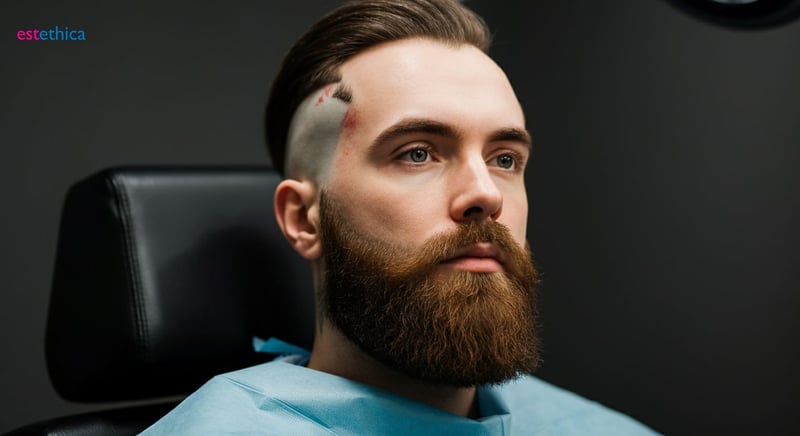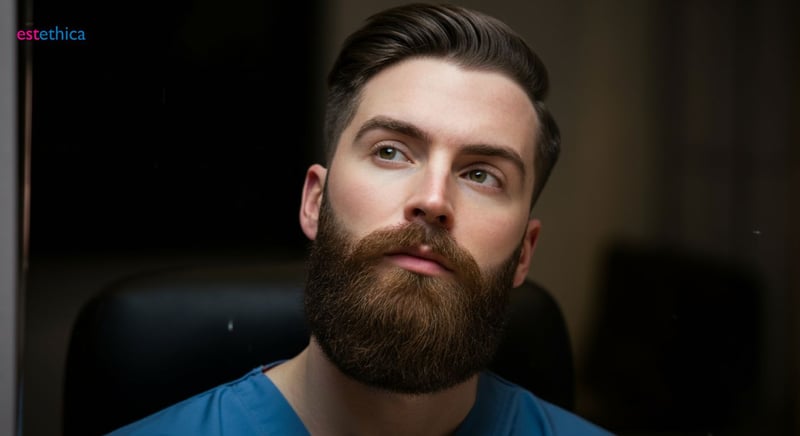Beard Restoration: Transform Your Look Today!
Rediscover confidence and style with beard restoration. estethica combines expertise and the latest techniques to bring natural and lasting results to your facial hair aspirations.
Beard restoration has become an increasingly popular solution for men seeking a fuller, more aesthetically pleasing facial appearance. As facial hair trends continue to surge, many are exploring options to boost their beard's density and growth. If you have struggled with patchy or thin facial hair, beard restoration techniques such as Follicular Unit Extraction (FUE) offer a way to achieve a natural and lasting transformation. estethica, a leader in aesthetic healthcare services, is at the forefront of utilizing cutting-edge technology to provide optimal results for their patients. In this article, we will delve into whether a facial hair transplant is right for you, explore the modern FUE beard transplant approach, and outline what to expect during the recovery process. Discover how beard restoration can redefine your look today.
Facial Hair Transplant: Is It Right for You?
Determining Candidacy for a Facial Hair Transplant
Deciding whether to undergo a beard transplant involves assessing several factors. Candidates often seek this procedure to address congenital alopecia, which prevents natural facial hair growth. Others may have patchy or thin beard hair due to genetic predispositions.
A successful facial hair transplant requires sufficient hair follicles in the donor area, usually the scalp, to supply the grafts for the beard. The procedure aims to provide a natural-looking beard that complements the patient’s facial structure and adheres to their aesthetic preferences. Patients should also be aware of potential beard transplant side effects, such as swelling or temporary numbness, and have realistic expectations about the beard transplant recovery time. For example, someone with minimal donor hair might not be an ideal candidate.
Key Considerations Before Undergoing a Facial Hair Transplant
- Evaluate Your Hair Loss Pattern: Understand the extent and pattern of your facial hair growth issues to determine if a transplant will provide significant improvement. For instance, if the patchy areas are small, a transplant may offer a noticeable difference.
- Assess Donor Hair Availability: The quality and quantity of hair in the donor area are critical for a successful transplant. Typically, the back of the scalp is used, and having dense hair there increases the likelihood of a good outcome.
- Consider Graft Placement and Density: Determine the desired density and style of your beard. A skilled surgeon can strategically place the grafts to achieve a natural and aesthetically pleasing result.

FUE Beard Transplant: The Modern Approach to Facial Hair Growth
Understanding the FUE Technique in Beard Restoration
The Follicular Unit Extraction (FUE) method represents a significant advancement in beard restoration. Unlike older techniques, FUE involves extracting individual hair follicles directly from the donor area, typically the back of the scalp. This approach minimizes scarring and allows for a more natural-looking result. The extracted follicles are then meticulously implanted into the beard area, following the natural direction and pattern of hair growth to ensure a seamless blend with existing facial hair. The precision of FUE beard transplant ensures that even those with minimal or patchy beard growth can achieve a full and well-defined beard.
One of the key benefits of FUE is the reduced beard transplant recovery time compared to traditional methods. Patients experience less discomfort and can typically resume their normal activities sooner. Furthermore, the absence of a linear scar in the donor area makes it an attractive option for those who prefer to wear their hair short. estethica utilizes advanced FUE techniques to provide patients with exceptional results, focusing on both the aesthetic outcome and the overall patient experience. The artistry involved in graft placement ensures results look completely natural.
The estethica Approach to FUE Beard Transplants
- Comprehensive Consultation: estethica begins with a detailed assessment of your facial hair and desired outcome to determine if you're a good candidate for a beard transplant.
- Advanced FUE Technology: Utilizing state-of-the-art equipment, individual hair follicles are carefully extracted to minimize trauma and maximize graft survival.
- Artistic Graft Placement: Skilled surgeons meticulously implant each follicle, paying close attention to angle and density to create a natural and aesthetically pleasing beard.

Beard Transplant Recovery: What to Expect After Surgery
Navigating the Post-Operative Phase After a Beard Transplant
Recovering from a beard transplant is a crucial phase that significantly impacts the final results. Generally, patients experience minimal discomfort, with most returning to their normal routines within a week. Adhering to post-operative guidelines is essential for promoting healing and ensuring the successful integration of the transplanted follicles. These guidelines typically include avoiding strenuous activities, maintaining proper hygiene to prevent infection, and attending follow-up appointments to monitor progress. A smooth beard transplant recovery ensures the grafts take hold properly, leading to a fuller, more natural-looking beard. Consistent care during this period mitigates potential complications and supports optimal facial hair growth.
During the initial days, it's normal to observe some redness and swelling around the transplanted area. Following specific cleaning protocols, provided by the clinic, helps to manage these symptoms effectively. Avoiding direct sunlight and harsh chemicals on the treated area, as well as refraining from shaving for a specified period, are also key aspects of post-operative care. Regular communication with the surgical team allows for adjustments to the recovery plan, ensuring customized care. For instance, a patient may be advised to use a special shampoo to cleanse the area gently. A well-managed recovery process is instrumental in achieving the desired density and appearance following a facial hair transplant.
Essential Aftercare Steps for a Successful Beard Transplant
- Gentle Cleansing: Use a mild, antibacterial soap to keep the transplanted area clean and free from infection. This helps prevent complications and promotes faster healing after undergoing a beard transplant.
- Avoid Strenuous Activity: Refrain from intense physical activity for at least two weeks to prevent disrupting the newly implanted grafts. This precaution maximizes the success rate of the beard restoration.
- Stay Hydrated: Drink plenty of water to maintain skin elasticity and support the healing process. Proper hydration aids in overall recovery and enhances facial hair growth.

Beard Restoration: Achieving Natural-Looking Results
The Art and Science Behind Natural Beard Transplants
Achieving natural-looking results from a beard transplant is a blend of skillful graft placement and comprehensive post-care. The aesthetic outcome relies heavily on the artistic expertise of the surgeon. estethica’s multi-disciplinary team ensures that each hair transplant from the beard is tailored to enhance the patient's unique facial structure, delivering outcomes that meet and exceed patient expectations. The detail-oriented approach considers factors such as hair direction, density, and the overall shape of the beard to ensure a seamless, natural integration with the patient’s existing facial hair growth.
The process begins with a detailed consultation to assess the patient’s goals and facial anatomy, followed by precise surgical execution and thorough aftercare guidance. The FUE beard transplant method is often favored for its minimal scarring and natural results. estethica emphasizes the importance of using advanced techniques to ensure high graft survival rates and patient satisfaction. For instance, they might use specialized instruments to minimize trauma to the hair follicles during extraction and implantation. This ensures a beard restoration that not only looks authentic but also stands the test of time.
Factors Influencing the Appearance of a Transplanted Beard
- Hairline Design:A well-designed hairline is crucial for a natural look. The surgeon must consider the patient’s age, facial shape, and personal preferences when creating the hairline. An experienced surgeon will use a technique to ensure a soft, diffused edge.
- Angle and Direction of Implantation:The angle at which the hair follicles are implanted significantly impacts the final appearance. Skilled surgeons mimic the natural growth patterns of facial hair, ensuring that the transplanted hairs blend seamlessly with existing hair.
- Density of Graft Placement:Achieving the right density is essential for a full and natural-looking beard. The surgeon must balance density with the available donor hair to avoid overharvesting and ensure a result that appears both full and natural.
Advanced FUE Method for Natural-Looking Beard Restoration
Comprehensive Post-Operative Care for Successful Beard Transplants
Frequently Asked Questions
Am I a good candidate for a facial hair transplant?
What is the FUE method for beard transplants, and how does it work?
What should I expect during the beard transplant recovery period?
How can I ensure a natural-looking result from my beard restoration?
Ready to discover the estethica difference with our world-class aesthetic and healthcare services?
📞 Call for a Free Consultation!